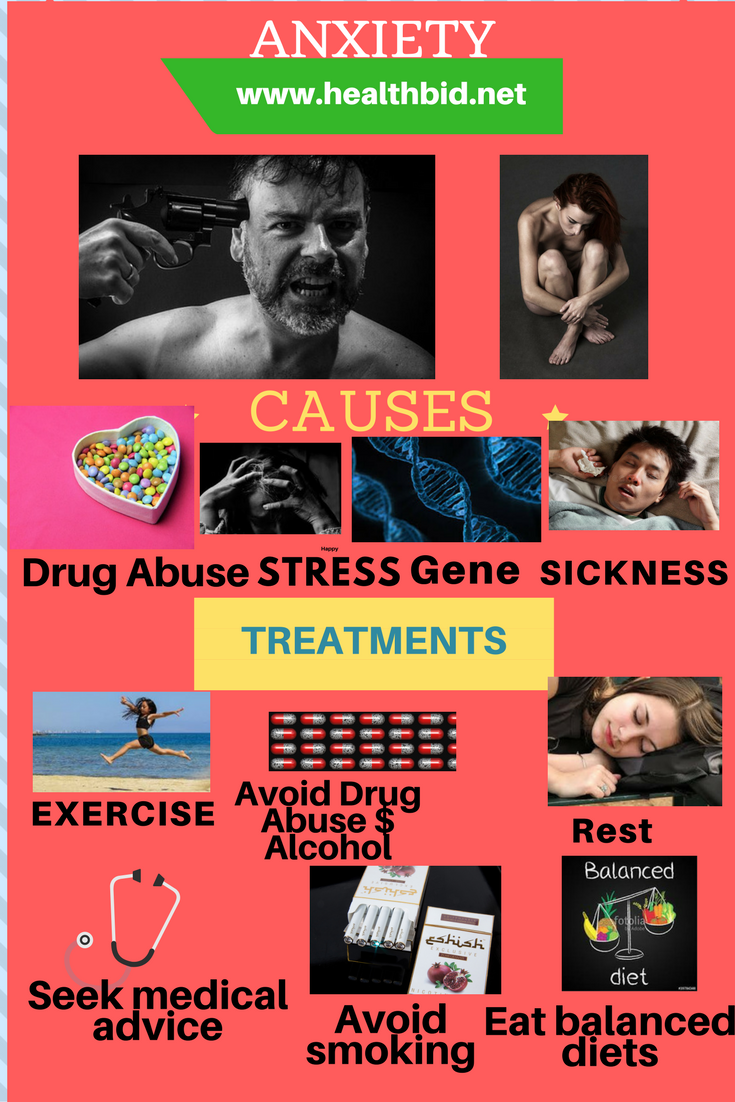
Anxiety is a feeling of unstable or insecure, like worry or fear, that may be delicate or severe. Hence, anybody can feel worried at some time in his or her life. For instance, you may feel worried mainly when you are trying to do unusual things in your life. Maybe a job interview, exams, test for HIV and aids, play a football match, etc. having fear In all the above-listed conditions, may be considered normal. However, some people find it hard to manage their worries. Their level of fear is usually high and might affect their normal health. the situation is known as anxiety disorder.
Types of anxiety disorder
Social anxiety disorder (SAD)
The symptoms of the social fear disorder include the following:
Feeling extremely nervous about being with others and also having a tough time speaking with them.
Being self-conscious before others and disturbed about being humiliated, rejected, or scared of infringing others people.
Being utmost afraid that others can judge you.
Distancing your self from places where others are.
Having a tough time making and keeping friends.
Blushing, sweating, or trembling when others are around.
Being vile or sick to your abdomen once others are around.
Obsessive-Compulsive Disorder. This is a continuous discord and unwanted thoughts that appear very difficult to manage.
Generalized anxiety disorder (GAD)
Most of all the people with GAD show excessive fear or worry, almost all the time and also face many anxiety-related problems.
Their symptoms include the following:
Feeling roving or jittery
Being weak.
Finding it hard to concentrate.
Muscle tension
Irritability
Finding it difficult to control or manage fear
Sleeping difficulty.
Post-Traumatic anxiety Disorder
This is a continues symptoms that occur after witnessing a traumatic incident like rape, natural blight, war, Nightmares, abuse, flashbacks, desensitizing of emotions, depression and feeling angry.
Panic disorder
Almost all the people with panic disorder usually experience sudden, quick and repeated panic attacks.
Symptoms of Panic disorder
Increasing heartbeat.
Chest pain.
Trembling.
Shortness of breath.
Choking.
sweating.
When to visit your doctor for anxiety
Book an appointment with your doctor when you experience any of the following:
When you noticed that the fear can never curtail on their own, rather impair with time.
You can see your doctor when the level of fear or anxiety in your system has increased to an extent that it affects your normal way of life.
When the level of fear in your body is distracting you from your work, relationship, or any other parts of your lifestyle.
Book an appointment with your doctor when you suspect that your fear or worry is connected to an ill health.
Seek medical care when you are having suicidal thoughts.
Causes of anxiety
Nobody has been able to discover the root causes of anxiety or worry. However, some researchers have attributed the under listed factors as the major cause.
Factors that cause anxiety
Unbalanced level of serotonin. This is an adrenalin or hormone that is liable for the control of fear in the body.
Genetic. You are more likely to develop fear if any of your parents is a carrier.
If you have a trace of drugs and alcohol abuse.
People with health-threatening conditions. Example, people with inflammatory diseases.
having a history of nerve-wracking or traumatic experiences, like violence, abuse etc.
How to prevent fear or anxiety
Living a healthy life pattern can help so much in preventing worry. The healthy life patterns include the under listed principles:
Regular checkup or early detection. Anxiety, like many other ailments, may impair with time if left untreated.
Partake in all the activities that give you pleasure.
Avoid alcohol or drug abuse. Alcohol and drug use will cause or worsen anxiety status.
Get pleasure from social interaction and caring relationships, which may reduce your worries.
Anxiety treatment
There are some treatment options available, they include medications, change in lifestyle and therapy. There’s no concrete proof of whether therapy or medication is more reliable, the selection of that is basically the choice of the person with the worry, and most people prefer therapy.
Medications
The medication option is SSRIs or SNRIs. They are the best in treating generalized anxiety disorder. The recommended treatment duration is always a minimum of one year. Stopping these medications sooner can lead to higher risk.
quetiapine Buspirone and pregabalin are alternative treatments for people that did not recover from SSRIs or SNRIs treatments. Diazepam, Benzodiazepines and clonazepam are also effective. Hence, they were stopped because of the danger of dependence and misuse.
The world health organization has warned that medications be used with care among older adult. They said that the adults are more likely to have the side effects due to synchronous physical disorders.
The use of medications for social anxiety disorder is not always the best option. However, the benzodiazepine is usually used to suppress any critical conditions.
Change in Lifestyle
This is an act of avoiding those things in your life that can lead to worry. An example includes smoking, alcoholism, drug abuse, minimize caffeine intake. And also embracing those things that can improve your life. An example includes having enough rest, regular exercise, making and keeping friends.
Therapy
Cognitive-behavioral therapy(CBT) is the most effective method of psychotherapy used to treat anxiety disorders patient. The cognitive-behavioural therapy makes it easier for people to understand the way they think so they can be able to control any sudden change in their system that can lead to panic.